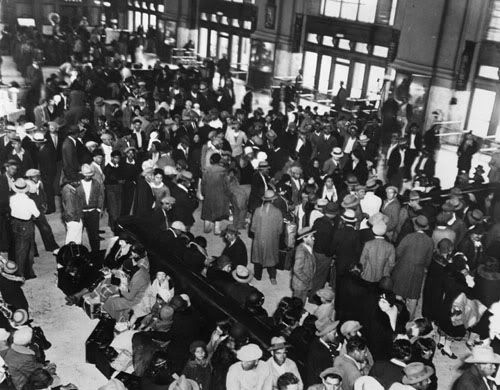“Tens of thousands, and possibly more than 400,000, Mexicans and Mexican-Americans were pressured — through raids and job denials — to leave the USA during the Depression, according to a USA TODAY review of documents and interviews with historians and deportees. Many, mostly children, were U.S. citizens.”
--USA Today April 5, 2006
A little-discussed aspect of The Great Depression was the fact that thousands of Mexican-Americans were illegally deported because white people needed jobs. This phenomenon is discussed at great length in the 1995 book Decade of Betrayal: Mexican Repatriation in the 1930s, by Francisco Balderrama and Raymond Rodriguez.
Fullerton was no exception. In Fullerton: A Pictorial History, Bob Ziebell quotes Gruzilla Mackey, a Fullerton teacher who taught in the Mexican work camps in the 20s and 30s:
“The American Community no longer spoke of ‘our’ Mexicans. They no longer considered that no ‘whiteman’ could pick oranges. Instead they felt that the jobs done so patiently by Mexicans for so many years should now be given to them. ‘Those’ Mexicans instead of ‘our’ Mexicans should ‘all be shipped right back to Mexico where they belong...And so, one morning we saw nine train-loads of our dear friends roll away back to the windowless, dirt-floor homes we had taught them to despise” (120).
The U.S. government has historically treated Mexican immigrants as more of a commodity than as human beings. For example, when the economy was booming in the early 20th century, “Mexicans poured into the USA, welcomed by U.S. factory and farm owners who needed their labor. Until entry rules tightened in 1924, they simply paid a nickel to cross the border and get visas for legal residency” (USA Today). However, when the stock market crashed in 1929 and white people needed jobs, "The government undertook a program that coerced people to leave," says Layla Razavi, policy analyst for the Mexican American Legal Defense and Education Fund (MALDEF).
This policy had far less to do with legal status than with skin color. “Employ no Mexican while a white man is unemployed," wrote George Clements, manager of the Los Angeles Chamber of Commerce's agriculture department, in a memo to his boss Arthur Arnoll. He said the Mexicans' legal status was not a factor: "It is a question of pigment, not a question of citizenship or right." (USA Today)

A crowd of Mexican American immigrants being sent back to Mexico in a formal repatriation (or deportation) in 1931-32.
